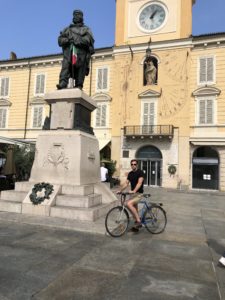
The new world
English
"The audio of the device immediately resounded with a scream from eighty thousand people who had just seen the ball dampen its powerful speed against the inert net behind the goalkeeper"
I read a few days ago this sentence written by Vincenzo Cerami, the famous Italian writer and screenwriter who died almost ten years ago. We owe him "Life is Beautiful" (“La Vita è Bella”), "The Monster" (“Il Mostro”) and other populars scripts. Among these, also that of "An Average Little Man", a subject brought to the big screen by Monicelli and starring Alberto Sordi—an extraordinary artist too often remembered only as a vernacular comedian—this time in a convincing dramatic role. "An Average Little Man" was a novel before it was a film, and the sentence I reported above is taken from the book written by Cerami in 1976.
The sentence struck a chord with me. To be frank, it made me suffer. "The audio of the device resonated"? "Dampening its powerful speed"? "Inert net behind the goalie"?
I'm all for lean, economical writing, which is the style I prefer when I read and feel mine when I write: too many adjectives and adverbs annoy me, just as I get irritated by too many metaphors and analogies. As the reader can notice, I am less bothered by long sentences.
Marinetti, the founder of the Futurist movement that was particularly popular in the first twenty years of the last century, in his "Technical Manifesto of Futurist Literature" encouraged the use of as many analogies as possible, as well as the elimination of the "how", the "which", the "thus", the "similar to": man-torpedo, woman-gulf were some of the examples proposed by Marinetti. It is not the style I prefer.
Instead of "by Marinetti", at the end of the previous sentence, I could have used "of the poet", "of the agitator", just to be more literary or journalistic—kinda like when sports journalists in Italy write "I granata" (“The garnet-reds”, referring to the color of their jerseys) to indicate the players of Torino, the soccer team—but the writing that sounds too much like writing irritates me** (I could have ended the sentence with "irritates me deeply", but would I have used deeply because the irritation is deep or because it is common to pair up the verb "to irritate" with the adverb "deeply"?).
These thoughts—choosing the right words, trying to figure out if the adjective I'm thinking of adding would help clarify my thoughts or give a good rhythm to the sentence, or is just common to use in that context—go through my head when I write.
I was not like this***, but since I started writing, I've started paying a lot more attention to the way I narrate events and express myself than I used to do.
Early on in my adventure in the world of writing, I wondered if after reading thousands of articles, essays, and books in my lifetime, I was capable of putting any of my thoughts on paper. And I soon realized that I had never seriously studied the structure of texts, or thought about the recipe of the pie that everyone likes so much that they keep asking for another slice—I had just wolfed it down.
Many years ago, during a school trip to Prague, a student a couple of years older than me, bass player in a band more of good will than good quality, told me that not being a musician I could not understand the musical innovation brought by the most popular group in history, the Beatles.
If I remember correctly, he told me about the particular "attack" of some of their songs—the innovation was in starting with two notes instead of the more common three or something like that, the details have been lost in time.
I didn't like his observation about my musical deficiencies, at the time I enjoyed listening to music and thought I "understood" the art, but he was right: I listened to the songs but didn't understand them, I could like a musical motif but didn't know why I liked it, I could feel the rhythm but didn't know how the musicians got there. I didn't know the historical and cultural context of the evolution of music, of the transition from one musical form to another, except for two or three sentences taken from others that I would throw out as if I was myself an expert.
Writing is a bit like watching a tennis match between Federer and Nadal; after having admired two champions, it seems not too complicated to pick up a tennis racket and, pin-pon, play more or less like them. But the optimistic spectator soon realizes that hitting the ball is already half a miracle, never mind aiming at a particular spot on the court.
We read a well-written, compelling article and tell ourselves that it is child's play to write something like that, “come on, it’s easy”, but when we take pen or keyboard in hand, doubts start to creep in.
Each sentence seems to hang together almost by some kind of divine intervention, and the descent to the conclusion leaves us holding our breath more for our unrestrainedness with the language than for the exciting content we offer to our readers.
We may also ask ourselves if the words we have chosen describe our thoughts properly or if instead, not having found the right words, we have changed our thoughts to fit the words that came easier to us.
My renewed interest for the written word—I say renewed because in my school years I enjoyed writing quite a bit—has also rekindled my interest for creation and creativity, broadly speaking. I have discovered the "magical consequences of paying attention".
The deeper we go into our studies and observations, the more we pay attention to what we experience, and the more we discover new forms and new meanings; layers of complexity that we had previously ignored show themselves, at first shy and then full of color, in a virtuous circle of investigations and reflections that make us move from the experience of a two-dimensional world to that of a world of infinite dimensions.
And then we begin to enjoy spending hours, days, weeks observing and analyzing how a product—whether it's a novel, a movie, a song, a suit—is crafted so that it induces certain emotions, and stimulates certain thoughts and considerations.
Although I have seen thousands of films in my life, I have realized, for example, that I had paid little attention to the shots and frames, colors and tones of the films I watched, experiencing instead the product only as a spectator. That is, I paid attention to the plot and the subject of the film but I ignored the theme, I let myself be carried away by the emotions that the plot, actors and setting gave me, but I didn't study the methods and tools used by screenwriters and directors to provoke those emotions.
I was watching some weeks ago "The Hunt", an interesting Danish film, well crafted, with an unresolved ending, of the kind I like. In one of the opening scenes of the film, the protagonist, played by Mads Mikkelsen, an excellent actor, gets a coffee and maybe an egg from the person who is serving him, now I don't remember who that was and I can't find the movie.
For a couple of seconds, the shot rests on the cup with the coffee—no dialogue, no faces, only the cup is framed. I wondered why the director decided to keep those two seconds of film. My answer—an anti-climax, I am aware—is that I don't know, it seems to me that the shot didn't give anything to either the dialogue or the scene, but my attention to a detail that I would not have noticed before pleased me: it made me realize that I had taken an intellectual direction of observation and investigation.
Returning to the topic of writing, for those who have little practice and would risk diving anyway into writing a note, article, or essay, the heavy burden of the school years is very much felt.
Instead of coming up with a clearly articulated opinion, these new authors tend to think that good writing is ornate, flowery, obscure—never mind that the reader understands it all. They do not "open the door, and it's warm", but "cautiously approach the brass, so that the mahogany gives space to the warm and joyful rays of the sun". In these early attempts at writing, the lyrical dimension of the story is favored over the accurate and entertaining description of facts and sensations.
The writers in the making get on the plane and write about the "august hovering of the aircraft", describe the boring wait in line as "interminable and excruciating torment"; they let themselves be carried away by the current of literary negativism that has been presented as “true literature” since the school days—after all, people happy with their lives do not write poems—and write about "the nefariousness of others", "acute pain that never gives respite", of "tears that flow like when the gates of the Nile opened and the waters became a flood".
Somehow one gets the impression that the "right way to write" includes expressions that we would never pronounce in face-to-face conversations or emails in response to a "how's it going?", or descriptions of plants that one would never notice—the hawthorn in bloom, the green and shiny leaves of the beech tree—all while delving into a thicket of verbal tenses from which it is difficult to find a way out even after consulting dusty grammars and lists of "if this, then that" of the "consecutio temporum".
After freeing themselves of the “unbearable heaviness” of the school years with a few first pieces that feel like reading William Shakespeare—kind of like breaking a fever with a vigorous sweat that flushes out the toxins—the new authors start writing like "normal" people.
And then, or at least I do, these new writers get into the habit of saving somewhere—in a notebook, in a text document, in the pages of a book—words, descriptions, and dialogues that they read and that impress them; the fear of not having ideas, when freed from the preoccupation that showing a part of oneself to other people often instills, gives way to the worry of having written too much and that the readers will get bored.
And there would be so much more to say, but there will be other articles and other dialogues, other ideas, and other reflections.
Notes
* It drives me nuts when people use the verb "to utilize" in place of the more concise "to use", which is also easier on the ears, but somehow "to utilize" has a more technical and bourgeois air to it and that is why it is used by those who like to, shall we say, posture.
*** The famous novelist Elmore Leonard said, at the end of his ten rules for good writing: If it sounds like writing, I rewrite it.
** I could have started the sentence with, "This was not the behavior I habitually engaged in," which would have given the period a professorial air, but "I was not like this" can suffice.
Italiano
“L’audio dell’apparecchio risuonò subito con un urlo di ottantamila persone che avevano appena visto la palla smorzare la sua potente velocità contro la rete inerte alle spalle del portiere”.
Ho letto qualche giorno fa questa frase scritta da Vincenzo Cerami, il famoso scrittore e sceneggiatore italiano scomparso quasi dieci anni fa, a cui si devono “La vita è bella”, “Il Mostro” e altri copioni di grande successo. Tra questi, anche quello di “Un borghese piccolo piccolo”, un soggetto portato sul grande schermo da Monicelli e interpretato da Alberto Sordi—un artista straordinario troppo spesso ricordato solo come comico dialettale—questa volta in convincente versione drammatica. “Un borghese piccolo piccolo” è stato un romanzo prima che un film, e le parole che ho riportato sopra sono prese dal libro scritto nel 1976.
La frase mi ha colpito. Ad essere sincero, mi ha fatto soffrire. “L’audio dell’apparecchio risuonò”? “Smorzare la sua potente velocità”? “Rete inerte alle spalle del portiere”?
Sono per una scrittura asciutta e parsimoniosa, è lo stile che preferisco quando leggo e sento mio quando scrivo: troppi aggettivi e avverbi mi infastidiscono, così come mi irritano troppe metafore e analogie. Come si può notare dalla frase precedente, meno mi infastidiscono i lunghi periodi.
Non me ne voglia Marinetti, il fondatore di quel Movimento Futurista che ebbe particolare diffusione e fortuna nei primi vent’anni del secolo scorso, che invece nel suo “Manifesto Tecnico della Letteratura Futurista” sollecitava a usare* quante più analogie possibili. Esortava inoltre a lasciar perdere i giri di parole, sopprimendo il “come”, il “quale”, il “così”, il “simile a”: uomo-torpediniera, donna-golfo, piazza-imbuto, erano gli esempi proposti da Marinetti. Non il mio stile.
Al posto di "di Marinetti", alla fine della frase precedente, avrei potuto usare "del poeta", "dell'agitatore", tanto per essere più letterario o giornalistico—un po’ come quando i giornalisti sportivi scrivono “I granata” per indicare i giocatori del Torino, la squadra di calcio—ma la scrittura che suona troppo come scrittura mi irrita** (avrei potuto terminare la frase con “mi irrita profondamente”, ma avrei usato profondamente perché l’irritazione è profonda o perché è comune fare seguire a “irrita” l’avverbio “profondamente”?).
Questi pensieri—la scelta del giusto vocabolo, il cercare di capire se l’aggettivo che sto pensando di aggiungere è opportuno per chiarire il mio pensiero, dare ritmo al passaggio o solo è consuetudine aggiungerlo—mi passano per la testa quando scrivo.
Non ero così***, ma da quando ho iniziato a scrivere, ho iniziato a prestare molta più attenzione al modo di raccontare rispetto a prima.
All'inizio della mia avventura da scribacchino, mi sono domandato se dopo aver letto migliaia di articoli, saggi e libri nella mia vita, fossi io in grado di mettere su carta qualsiasi pensiero. E mi sono presto reso conto di non aver mai studiato seriamente la struttura dei testi, né di aver pensato alla ricetta della torta che piace così tanto che tutti continuano a chiederne un’altra fetta: l'avevo solo divorata.
Molti anni fa, durante una gita scolastica a Praga, uno studente di un paio d'anni più grande, bassista in una band più di buona volontà che di buona qualità, mi disse che non essendo io un musicista non potevo capire l'innovazione musicale portata dal gruppo più popolare della storia, i Beatles.
Se ben ricordo, mi parlò del particolare ”attacco” di alcune loro canzoni—l’innovazione stava nell’iniziare con due note invece delle più comuni tre o qualcosa del genere, i dettagli si sono persi nel tempo così come il mio interesse per le note.
La sua osservazione sulla mia mancanza di cultura musicale non mi piacque, all’epoca mi piaceva ascoltare musica e pensavo di “capirne”, ma aveva ragione lui: ascoltavo ma non me intendevo, poteva piacermi una canzone ma non capivo perché mi piacesse, percepivo il ritmo, ma non sapevo e nemmeno riflettevo su come i musicisti ci fossero arrivati. Del contesto storico e culturale del passaggio da una forma musicale all’altra non sapevo nulla, se non due o tre frasi prese da altri che buttavo lì come se me ne intendessi.
Scrivere è un po’ come guardare una partita di tennis tra Federer e Nadal; dopo aver ammirato due campioni, sembra non troppo complicato prendere una racchetta e, pin-pon, giocare più o meno come loro, ma in realtà presto ci si accorge che centrare la pallina è già un mezzo miracolo.
Leggiamo un articolo ben scritto, avvincente, e ci diciamo che è un gioco da ragazzi scrivere qualcosa di simile. Ma quando prendiamo la penna o la tastiera in mano i dubbi ci assalgono, ogni frase sembra reggersi in piedi quasi per miracolo, e la discesa verso la conclusione lascia con il fiato sospeso più per le spericolatezze con la lingua che per i contenuti.
Ci chiediamo poi se le parole che abbiamo scelto ben descrivano il nostro pensiero o se invece, non avendo trovato le parole giuste, abbiamo cambiato il nostro pensiero per adeguarlo alle parole che ci venivano più facili.
Il mio rinnovato interesse per la scrittura—dico rinnovato perché negli anni della scuola scrivere mi piaceva parecchio—ha anche ravvivato il mio interesse per la creazione e la creatività. Ho scoperto le “le magiche conseguenze del prestare attenzione”. Più andiamo in profondità nello studio delle forme e dei contenuti, più scopriamo altre forme e nuovi contenuti; strati di complessità che prima ignoravamo si mostrano, prima timidi e poi pieni di colore, in un circolo virtuoso di indagini e riflessioni che ci fanno procedere dal vissuto di un mondo a due dimensioni a quello di un mondo a dimensioni infinite. E ci troviamo a passare ore a osservare, studiare come si debba costruire un prodotto—può essere un racconto, un film, una canzone, un vestito—affinché provochi certe emozioni e stimoli certe riflessioni.
Pur avendo visto migliaia di film nella mia vita, mi sono ad esempio reso conto di aver prestato poca attenzione alle inquadrature e ambientazioni, ai colori e toni dei film che guardavo, esperendo il prodotto solo da spettatore. Prestavo cioè attenzione alla trama e al soggetto del film ma ignoravo il tema, mi lasciavo avvolgere e trasportare dalle emozioni che la storia mi dava ma non studiavo i mezzi usati da sceneggiatori e registi per provocarle.
Guardavo qualche settimana fa “The Hunt”, un film danese interessante, ben costruito, con un finale irrisolto di quelli che piacciono a me. In una delle scene iniziali del film, il protagonista, interpretato da Mads Mikkelsen, un ottimo attore, riceve un caffè e forse un uovo da chi lo sta servendo, ora non ricordo chi fosse e non riesco a trovare il film. Per un paio di secondi l’inquadratura si posa sulla tazzina, non c’è dialogo, non ci sono visi, solo la tazzina è inquadrata.
Mi sono chiesto perché il regista avesse deciso di tenere quei due secondi di pellicola. La mia risposta è che non lo so—chiaro, non una gran osservazione la mia—mi pare l’inquadratura non desse niente né al dialogo né alla scena, ma la mia attenzione per un dettaglio che prima non avrei notato mi è piaciuta, mi ha fatto capire di aver preso una certa direzione intellettuale di osservazione e indagine.
Tornando alla scrittura, per chi ha poca pratica e lo stesso decidesse di avventurarsi nella stesura di un commento, un articolo, un saggio, la pesante eredità della scuola si fa sentire. Invece di proporre un pensiero espresso con chiarezza, i nuovi scrittori tendono a pensare che il “bello scrivere” sia ornato, floreale, oscuro—non sia mai che si capisca tutto bene.
Non si “apre la porta e fa caldo”, si “porta cautamente la mano all’ottone, affinché il mogano dia spazio ai caldi e gaudenti raggi del sole”; si dà fiato alle trombe con i sicché, benché, essi, ella; quasi si arriva al “voi” mussoliniano, che darebbe la giusta “gravitas” al racconto.
In questi primi tentativi di scrittura, la dimensione lirica del racconto prende il sopravvento sulla descrizione accurata e avvincente dei fatti e delle emozioni. Gli scrittori in divenire salgono sull’aereo e raccontano dell’”augusto librarsi del velivolo”, descrivono la noiosa attesa in coda come “interminabile e lacerante supplizio”; si fanno trasportare dalla corrente di negatività letteraria che dai tempi della scuola è presentata come letteratura vera—d’altronde chi è contento della propria vita non si mette a scrivere poesie—e scrivono di “nequizie del prossimo”, “acuto dolore che non dà tregua giammai”, di “lagrime che scorrono come quando si apersero le cateratte del Nilo e le acque si fecero piena”.
In qualche modo si ha l'impressione che questo sia il modo giusto di scrivere, usando espressioni che non pronunceremmo mai in conversazioni vis a vis o email di risposta a un “come va?”, descrivendo piante che mai si noterebbe—il biancospino in fiore, le verdi foglie del faggio—mentre ci si addentra in un roveto di tempi verbali da cui è difficile districarsi anche dopo aver consultato grammatiche impolverate e liste di "se questo, allora quello" della consecutio temporum.
Dopo essersi liberati della pesante eredità scolastica con qualche primo pezzo che sembra di leggere Ippolito Nievo—un po’ come ci si libera della febbre con una bella sudata che butta le tossine fuori dal corpo—i nuovi autori iniziano a scrivere come persone “normali”.
E poi, o almeno io lo faccio, si prende l’abitudine di conservare—in un quaderno, in un file di testo, in qualche foglio volante—parole, descrizioni e dialoghi che leggiamo e ci colpiscono; la paura di non avere idee, quando liberati dal timore che presentare agli altri una parte di sé spesso infonde, lascia spazio alla preoccupazione di aver scritto troppo e di perdere i lettori per strada.
E ci sarebbe tanto altro da dire, ma ci saranno altri articoli e altri dialoghi, altre idee e altre riflessioni.
Note
* Mi fa uscire di senno l’uso del verbo “utilizzare” al posto del più conciso è più facile alle orecchie “usare”, ma in qualche modo “utilizzare” ha un’aria più inglese, più tecnica e per questo è usato da chi ama, diciamo, atteggiarsi.
** Il famoso romanziere Elmore Leonard disse, nelle sue “dieci regole per una buona scrittura”: Se sembra scritto, lo riscrivo (la traduzione dall’inglese “If it sounds like writing, I rewrite it”, non è semplice, ma la mia dà l’idea).
*** Avrei potuto iniziare la frase con, “Non era questo il comportamento che abitualmente tenevo”, che avrebbe dato un’aria professorale al periodo, ma “Non ero così” può bastare.








